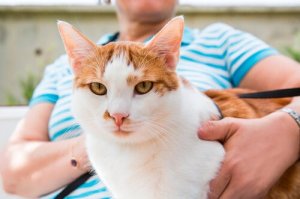Cats Love Their Owners' Company


Written and verified by the lawyer Francisco María García
Many people think cats are too aloof, too independent and not very affectionate. Felines are often associated with witches and bad luck, especially in our culture. There are even some who actually believe these beautiful animals are treacherous. Yet it’s quite the contrary; not everything is as it seems. Cats, in fact, love their owners and enjoy our company.
It’s clear that cats respond differently than dogs. Their survival instinct is specifically evolved to avoid the danger that other larger and stronger species pose. Beyond this, small cats are quite capable of creating a strong bond emotional with people.
The truth is, cats love being with their owners. Today we’d like to tell you more about it and even show you some evidence on how much these animals can love us humans.

Those who are familiar with cats often say that the longer a cat is around, the sooner they’ll get into the habit of following them wherever they go. Cats are social creatures and they want more than just mere coexistence. For example, you get up, go to the bathroom and then go to the kitchen for breakfast. Suddenly…surprise! There’s your cat.
There are many hypotheses about what causes such behavior. Some believe it’s a way to mimic our movements. In contrast, others say that domestic cats follow their humans to amuse and distract themselves.
Cats love licking humans
Some small cats get pretty close to humans. So much so that they usually lick the head or even the hair of their guardians. This is not too common, but it’ll happen if you move carefully.
Actually, this is a way in which cats show affection and loyalty to other cats who are members of their family. However, because they’re used to us, they often show their feelings of affection –and, of course, they do so in their language. It’s their way of telling us that we belong together and that they recognize us as members of their family.
We must also remember that this action of licking the head and fur is something cats do when they groom their young. It’s quite logical to conclude that felines only lick those they have a strong bond with.
Cats’ special relationship with women
Who hasn’t heard about cat ladies – referring to middle-aged to older women who are single and end up living with cats as their sole companions? As you may already know, there’s always some truth to every stereotype. The truth is that cats do have a very special connection with women.
As it turns out, a study carried out by scientists at the University of Vienna showed that reciprocation develops between women and felines. Cats can read and interpret the needs of their owners and be there when they’re needed most.
The aforementioned study also indicated that this species can remember every kind thing a human did for them. They’re eternally grateful and repay the favors with their love and company.
Cats love their owners
According to another recent study published by the Behavioral Processes journal, felines prefer to interact more with humans than with any other animal or object. To prove it, they had to verify the behavior of a group of cats who were isolated from food, toys, and their owners.
After a few hours, the cats that were part of the experiment showed a greater need to interact with their people than with anything else. The most surprising thing was to see that some would much rather be with their owners than eating.
This kind of brings down the myth that cats are too independent, petty and aloof. It’s a lie!
Almost all cats sleep on top of their owners

You’ve most likely been sleeping to suddenly wake up to find your cat on top of you. Either that or on your feet; even on your face. Unlike dogs, felines prefer to spend the night sleeping closely to those around them.
There are many reasons to explain this behavior. The main one is that cats prefer warm sleeping places. Nighttime is that part of the day when temperatures tend to drop considerably.
In conclusion, cats love being with their owners and there’s plenty of proof out there.
Many people think cats are too aloof, too independent and not very affectionate. Felines are often associated with witches and bad luck, especially in our culture. There are even some who actually believe these beautiful animals are treacherous. Yet it’s quite the contrary; not everything is as it seems. Cats, in fact, love their owners and enjoy our company.
It’s clear that cats respond differently than dogs. Their survival instinct is specifically evolved to avoid the danger that other larger and stronger species pose. Beyond this, small cats are quite capable of creating a strong bond emotional with people.
The truth is, cats love being with their owners. Today we’d like to tell you more about it and even show you some evidence on how much these animals can love us humans.

Those who are familiar with cats often say that the longer a cat is around, the sooner they’ll get into the habit of following them wherever they go. Cats are social creatures and they want more than just mere coexistence. For example, you get up, go to the bathroom and then go to the kitchen for breakfast. Suddenly…surprise! There’s your cat.
There are many hypotheses about what causes such behavior. Some believe it’s a way to mimic our movements. In contrast, others say that domestic cats follow their humans to amuse and distract themselves.
Cats love licking humans
Some small cats get pretty close to humans. So much so that they usually lick the head or even the hair of their guardians. This is not too common, but it’ll happen if you move carefully.
Actually, this is a way in which cats show affection and loyalty to other cats who are members of their family. However, because they’re used to us, they often show their feelings of affection –and, of course, they do so in their language. It’s their way of telling us that we belong together and that they recognize us as members of their family.
We must also remember that this action of licking the head and fur is something cats do when they groom their young. It’s quite logical to conclude that felines only lick those they have a strong bond with.
Cats’ special relationship with women
Who hasn’t heard about cat ladies – referring to middle-aged to older women who are single and end up living with cats as their sole companions? As you may already know, there’s always some truth to every stereotype. The truth is that cats do have a very special connection with women.
As it turns out, a study carried out by scientists at the University of Vienna showed that reciprocation develops between women and felines. Cats can read and interpret the needs of their owners and be there when they’re needed most.
The aforementioned study also indicated that this species can remember every kind thing a human did for them. They’re eternally grateful and repay the favors with their love and company.
Cats love their owners
According to another recent study published by the Behavioral Processes journal, felines prefer to interact more with humans than with any other animal or object. To prove it, they had to verify the behavior of a group of cats who were isolated from food, toys, and their owners.
After a few hours, the cats that were part of the experiment showed a greater need to interact with their people than with anything else. The most surprising thing was to see that some would much rather be with their owners than eating.
This kind of brings down the myth that cats are too independent, petty and aloof. It’s a lie!
Almost all cats sleep on top of their owners

You’ve most likely been sleeping to suddenly wake up to find your cat on top of you. Either that or on your feet; even on your face. Unlike dogs, felines prefer to spend the night sleeping closely to those around them.
There are many reasons to explain this behavior. The main one is that cats prefer warm sleeping places. Nighttime is that part of the day when temperatures tend to drop considerably.
In conclusion, cats love being with their owners and there’s plenty of proof out there.
This text is provided for informational purposes only and does not replace consultation with a professional. If in doubt, consult your specialist.








